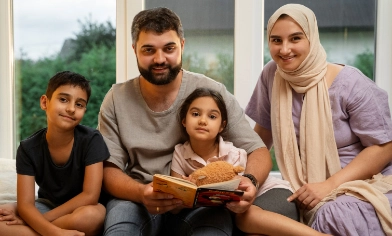In this article

Why life insurance matters
We often protect the things we care about, like our home, car or phone, just in case anything goes wrong. But we don’t always think about protecting the people who matter most.
Life insurance helps take care of your loved ones if you pass away. While it can’t take away the sadness of losing someone close, it can help give your family some financial support during a very difficult time. They might need help paying the rent or mortgage, covering bills and everyday expenses or staying secure in the future, especially if there are children who may need help with education costs.
It also means your family can stay in their home, feel more stable and have time to grieve without added money worries.
People often get life insurance when something big is happening, like buying a home, getting married or having a baby. But you don’t have to wait. You can get life insurance at any age, but it’s usually cheaper when you’re younger.
The key benefits of life insurance
Here are some of the main reasons people choose life insurance:
- It can help give your loved ones financial security
- It can ease the impact of losing a parent or partner
- It can help replace lost income if you’re no longer around
- It can go towards paying off debts, like a mortgage, or covering rent
- Some policies help cover funeral costs
- Some extras, like critical illness cover, can help if you get seriously ill and can’t work
- Most of all, it can give you peace of mind knowing your loved ones are protected
If you’re not sure whether life insurance is right for you, try asking yourself:
- Do you have a partner or children who rely on your income?
- Do you have a mortgage or other debts?
- Would your death leave your family struggling financially?
If you answered yes to any of these, life insurance might be worth thinking about.
Remember, it might not always be easy to save money. Even when we try, unexpected costs, both good and bad, can quickly use up what we've put away. Life insurance could help fill that gap and make sure your family has much-needed support when they need it most.
Read more:
What kinds of life insurance are there?
There are two main types of life insurance: term life insurance and whole of life insurance. Each one works a bit differently, so it’s important to think about what suits your needs best.
Term life insurance
Term life insurance covers you for a set period of time, like 10, 20 or 30 years. If you die during that time, the policy pays out money to your loved ones. If the term ends and you're still alive, the policy stops and there’s no payout.
You can take out another policy when the term ends if you still want cover. Just keep in mind that your monthly payments, or premiums, will likely cost more when you’re older or if your health has changed.
There are three kinds of term life insurance:
- Decreasing term: The payout gets smaller over time, usually in line with your mortgage. It’s often used to help your family pay off the rest of the mortgage if you pass away. It’s sometimes called mortgage life insurance
- Level term: The payout stays the same no matter when you die during the term. You might choose this if you want the money to go toward something specific, like your children’s education or other planned expenses
- Increasing term: The payout goes up over time to help keep up with rising prices (inflation). This can cost a bit more but it helps make sure the money still has the same value in the future
Whole of life insurance
Whole of life insurance covers you for the rest of your life and guarantees a payout when you die. Post Office Over 50s Life Cover is a type of whole of life insurance that is taken out by people aged 50 to 80.
One of the biggest benefits it that you won’t need a medical exam and you’re guaranteed to be accepted, even if you have health conditions. This could make it a good option if you’ve had trouble getting life insurance before.
But it’s important to know that the payout is usually smaller than with term life insurance.
This type of policy is often used to help with funeral costs or unpaid bills, so your family has less to worry about.
How much am I leaving behind for my loved ones?
Do you know how much your loved ones would get if you were to pass away? Many of us don’t. Getting a life insurance policy or reviewing one you already have can help you understand exactly what they would receive.
Use our free life insurance calculator to help you plan.
Are there other ways to help protect my family?
Yes, life insurance is just one part of a bigger plan. Here are a few other things to think about:
- Death in service: Some employers offer this. If you die while working for them, they pay a lump sum, often three or four times your salary, to someone you choose. If you’re employed, check your contract to see if your employer provides a death-in-service benefit. Or read why life insurance is important if you’re self employed
- Saving and investing: It’s always a good idea to put money aside, if you can. Things like pensions or ISAs (Individual Savings Accounts) can help your money grow over time. Some pensions, like SIPPs (Self-Invested Personal Pensions), even get a bonus from the government
- Trusts: Some people place their life insurance in a trust so the payout doesn’t count as part of their estate. This can help reduce inheritance tax but it’s complex so get independent advice if you’re thinking about this
Planning ahead means looking at all your options, including life insurance, savings, work benefits, and making sure your family will be okay if something happens to you.
Key takeaways
- Life insurance can help support your loved ones financially if you pass away, by covering things like bills, debts or funeral costs. It can also give them the time and space to grieve without having to worry about money
- There are two main types of cover: term life insurance (which lasts for a set time and may be cheaper when you’re younger) and whole of life insurance (which lasts your entire life). A common type of whole life insurance is over 50s life cover
- Choosing the right cover depends on your age, needs and budget. There are two main types of cover: term life insurance (which lasts for a set time and may be cheaper when you’re younger) and whole of life insurance (which lasts your entire life). A common type of whole life insurance is Over 50s Life Cover, which often guarantees acceptance. It’s important to understand how each one works before you decide
Protect your loved ones with life insurance
Common questions about life insurance
-
Life insurance usually pays out a lump sum if you die while the policy is active. Your family can use this money to help with mortgage or rent payments, household bills, childcare, funeral costs or anything else they need. Always check the policy details to know what’s included.
-
Yes, you still might. Life insurance can help cover things like funeral costs or unpaid debts so that your family doesn’t have to. You can also choose someone else important to you, like a parent or sibling, to receive the money.
-
It depends on your situation. Think about what your family would need to stay in their home, pay the bills and cover any future costs. You can use a life insurance calculator to get a quick estimate.
-
Savings are helpful, but they can run out quickly especially if something unexpected happens. Life insurance gives your family a guaranteed payout if you pass away during the policy, which can give extra peace of mind.
- Read more
-
They sound similar but there’s a small difference. Life insurance usually lasts for a set time (like 20 or 30 years). Life assurance often means a policy that covers you for your whole life. Always read the policy to understand what it offers.
Learn more about life assurance and life insurance in our guide.
-
If you miss a payment, your cover might stop. Some insurers give you a short period to catch up, but if you miss more than one, the policy could be cancelled. If you're worried about payments, contact your insurer as soon as possible.
Our life cover products
-
Life insurance
Choose between level, decreasing or increasing term insurance, each designed to offer you peace of mind based on your circumstances.
-
Over 50s life cover
If you're aged between 50 and 80, we could help you leave a cash sum for your family or towards your funeral costs.
Related guides

Why life insurance still matters, even in a cost-of-living crisis
With bills going up, it’s natural to look for ways to cut costs. But cancelling your life insurance could lead to bigger problems later. Here’s why keeping your cover matters and how Post Office can help.

Common law partnerships: how to protect each other financially
If you’re not married or in a civil partnership, your partner might face financial challenges they otherwise wouldn’t if you died. This guide explains what you can do to help protect them.

Life assurance vs life insurance
What is life assurance and is it the same as life insurance? Our guide explains it all.

How much is a funeral in the UK?
No one really likes to think about their funeral. But it’s important to because they can be expensive.

Over 60s life insurance
Turning 60 is a special milestone, but it’s also a good time to think about how you can protect your loved ones in the future.

What do I need to apply for life insurance and how does the process work?
Thinking about life insurance? Here’s what you’ll need to apply, how long it takes and how the process works from start to finish.

How does inheritance tax work?
Inheritance tax is a tax that might need to be paid on the estate you leave when you die. The rules can be complex but, with good planning, you can often reduce how much is owed.

Can you write your own will?
A properly written will protects your loved ones and helps make sure provisions you’ve made like life insurance get paid to the right person if you die.

How to find out if someone has a life insurance policy
From knowing who to contact to the information you’ll need, here are the steps you can take.

6 reasons why you need life insurance
It seems there are certain events in people’s life that prompt them to buy life insurance.

The nation's relationship with life insurance
For many people, life insurance is an important way to protect their loved ones. But how many of us actually have it? And how much do people really know about this kind of cover?

Life insurance for self-employed people
Life insurance is more than just a safety net. It can be a smart investment in your family’s future and your business’s continuity, especially if you’re self-employed.

Understanding mortgage life insurance
If you want to leave your loved ones financial protection for your home, even if you’re not there to help pay the mortgage, you may want to take out mortgage life insurance.
Joint vs single life insurance policies for couples: what’s best for you?
Choosing the right life insurance policy as a couple can be challenging. Should you apply for one joint policy or take out separate single policies instead?

What is life insurance?
Life insurance can offer your loved ones peace of mind and financial security if you pass away or become critically ill.

Death in service vs life insurance
Death in service cover is a useful employee benefit but relying on it alone could put your family at risk financially. Find out how it compares to life insurance and why it’s a good idea to have both.

Life insurance and critical illness cover at 50: Protecting your future while you enjoy new adventures
Turning 50 is a great time to try new things. The right life cover can help you enjoy travel, hobbies and big life changes without worry.

Family life insurance: protecting your loved ones
Your family is unique. Protecting them from life’s uncertainties is important. Life insurance offers a way to provide financial security for your loved ones if something happens to you.

10 tips for keeping kids safe on holiday
We all know the feeling – getting to the airport, then a wave of panic comes over you. Did you remember your passport? What time's the flight? And where on earth did you put the kids?

Teen travel: holiday ideas for teenagers and tips for parents
Travel can help teenagers grow and discover new places. This guide shares the best trips for teens, advice for those travelling independently for the first time, plus tips for parents too.

Family travel insurance
Going on a trip with your family is a great way to spend time together. It could be a holiday, a weekend away or a big trip abroad.